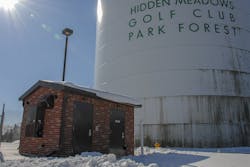Prefabricated Housed Disinfection System Helps Upgrade Facilities & Safety
Even the best-designed and most regularly maintained systems eventually reach the end of their lives. From worn components to growing demands that aging equipment can no longer accommodate, this is an inevitable reality associated with running a municipal water supply.
Like all well-managed municipalities, Park Forest, Ill., understands this. When systems show their age, villages strive to replace and upgrade that system in a way that will bring the greatest benefit to the community.
Metropolitan Ind. has been working with the village of Park Forest on such projects since 2005, when it supplied two new prefabricated elevated tank water booster systems. Several years later, when the village’s supervisory control and data acquisition (SCADA) system was not performing to its expectations, it knew who to call, and Metropolitan knew it were going to want a complete solution it could count on, from initial design through reliable 24/7 servicing.
This time around, Metropolitan was asked to help replace the aging disinfection building while also improving the safety and current disinfection system. The desired outcome was to help the municipality transition from chlorine gas to sodium hypochlorite, providing the village with a safe disinfection process for potable water treatment. This change would help keep the surrounding community—including Governors State University and a row of homes that backed up to the area—as safe as possible.
[Visit Metropolitan’s WWD Storefront]
Conveniently, this new method would also provide a cost savings to the village while making the facility easier to service due to the rest of Park Forest operating with sodium hypochlorite. Enjoying the quality of a prefabricated Metropolitan building was an added bonus.
